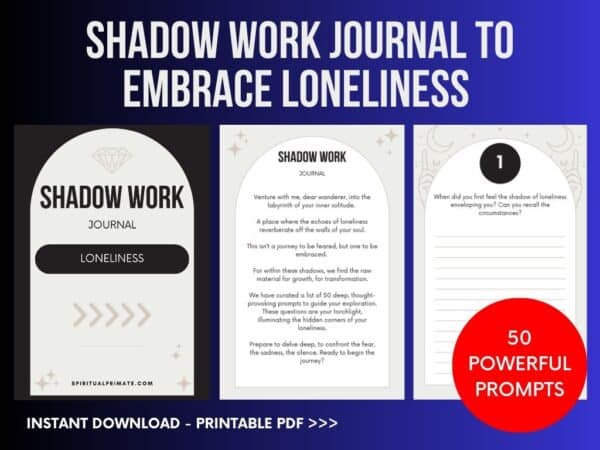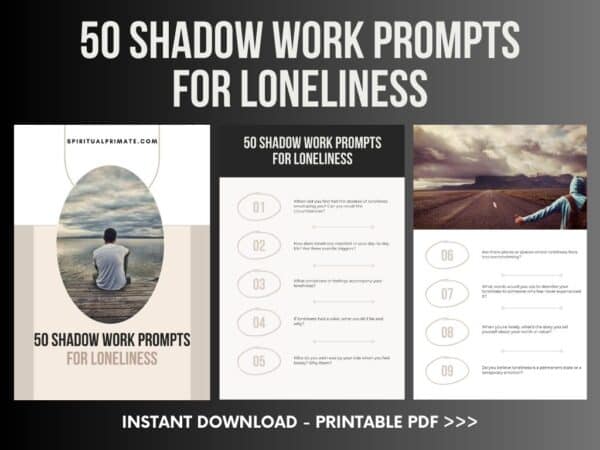Venture with me, dear wanderer, into the labyrinth of your inner solitude. A place where the echoes of loneliness reverberate off the walls of your soul.
This isn’t a journey to be feared, but one to be embraced. For within these shadows, we find the raw material for growth, for transformation.
We have curated a list of 50 deep, thought-provoking prompts to guide your exploration. These questions are your torchlight, illuminating the hidden corners of your loneliness.
Prepare to delve deep, to confront the fear, the sadness, the silence. Ready to begin the journey?

Loneliness: An Insight into the Human Condition
Understanding Loneliness
Loneliness, a universal human experience, is a complex and multifaceted phenomenon. It is not merely the absence of companionship or the state of being alone; rather, it is a deep-seated emotional state that encapsulates a myriad of feelings, including isolation, rejection, and disconnection.
The Dichotomy of Loneliness
While loneliness can be painful and distressing, it is not inherently negative. In its raw form, loneliness can be a catalyst for self-reflection and growth. It can serve as an invitation to delve into the depths of our inner world, enabling us to understand ourselves better and foster a richer connection with our inner selves.
Loneliness and Society
Loneliness is often a by-product of our increasingly disconnected society. Despite being more connected than ever before, thanks to technology, many people feel isolated and detached. This paradox of connection and disconnection is a significant contributor to the pervasive loneliness experienced in contemporary society.
Coping with Loneliness
Coping with loneliness involves acknowledging and accepting it, rather than resisting or ignoring it. It’s about finding healthy ways to connect with others, foster meaningful relationships, and cultivate a sense of belonging. However, it’s equally important to nurture our capacity to be alone, to find comfort and peace in our solitude.
Transforming Loneliness
The transformation of loneliness into a positive, growth-oriented experience is possible. It requires a shift in perspective, viewing loneliness not as a state to be feared, but as an opportunity for introspection and self-discovery. It is about using the silence and space that loneliness provides to deepen our understanding of ourselves and the world around us.
In conclusion, loneliness is a complex, nuanced aspect of the human experience. Its understanding and transformation demand empathy, patience, and courage. As we navigate the labyrinth of loneliness, we may just uncover a path leading to personal growth and profound self-awareness. But the question remains, are we ready to embark on this journey?

Shadow Work: A Pathway Out of Loneliness
Shadow Work: An Introduction
Shadow work is a psychological practice that encourages individuals to explore and integrate their ‘shadow selves’. This term, coined by Swiss psychiatrist Carl Jung, refers to those aspects of our personality that we reject, ignore, or suppress. Shadow work operates on the premise that acknowledging and understanding these aspects can lead to personal growth and healing.
The Connection Between Shadow Work and Loneliness
Loneliness often stems from a sense of disconnection or isolation, not just from others, but also from ourselves. This disconnection can arise when we suppress our shadow selves, creating inner conflict and a sense of alienation. Shadow work helps bridge this disconnect by encouraging us to embrace all aspects of our identity, fostering a sense of internal harmony and reducing feelings of loneliness.
The Process of Shadow Work
Shadow work involves introspection, self-awareness, and a willingness to confront uncomfortable truths about ourselves. This process can be challenging but it is also deeply transformative. By shining a light on our shadow selves, we can reconcile these hidden aspects of our identity, fostering a sense of wholeness and self-acceptance that can alleviate feelings of loneliness.
The Benefits of Shadow Work
By integrating our shadow selves, we can experience a range of benefits. This includes increased self-awareness, improved relationships, and a healthier relationship with our emotions. Moreover, by understanding and accepting our shadow selves, we can cultivate a sense of inner peace and contentment that can help combat loneliness.
Practicing Shadow Work
There are various techniques for practicing shadow work, including journaling, meditation, and therapy. Each technique encourages introspection, self-awareness, and the exploration of our unconscious mind. By regularly engaging in shadow work, we can gradually uncover, understand, and integrate our shadow selves, paving the way for personal growth and a reduced sense of loneliness.
In conclusion, shadow work presents a powerful tool for exploring and integrating our shadow selves. In doing so, it can help us foster a sense of internal harmony and self-acceptance, reducing feelings of loneliness and isolation. So, are you ready to embark on this transformative journey of shadow work?

Shadow Work Prompts for Loneliness
1. When did you first feel the shadow of loneliness enveloping you? Can you recall the circumstances?
2. How does loneliness manifest in your day-to-day life? Are there specific triggers?
3. What sensations or feelings accompany your loneliness?
4. If loneliness had a color, what would it be and why?
5. Who do you wish was by your side when you feel lonely? Why them?
6. Are there places or spaces where loneliness feels less overwhelming?
7. What words would you use to describe your loneliness to someone who has never experienced it?
8. When you’re lonely, what’s the story you tell yourself about your worth or value?
9. Do you believe loneliness is a permanent state or a temporary emotion?
10. How has loneliness shaped your relationships with others?
11. If loneliness were a person, what would you want to say to them?
12. What does loneliness prevent you from doing? Why?
13. How does loneliness affect your perception of time?
14. If you could pack up your loneliness and leave it somewhere, where would it be?
15. What are the hidden gifts or lessons that loneliness has offered you?
16. Is there a book, movie, or song that encapsulates your feelings of loneliness?
17. How does loneliness affect your sleep and dreams?
18. If you could visualize your loneliness, what form would it take?
19. How does loneliness influence your creative expression?
20. If loneliness had a voice, what would it say?
21. What are your coping mechanisms when loneliness strikes? Are they helpful or harmful?
22. What’s the most intense peak of loneliness you’ve ever experienced?
23. Can loneliness be a catalyst for growth? How?
24. Are there certain times of the day or year when you feel more lonely?
25. Is your loneliness more tied to the absence of people or the absence of connection?
26. What does loneliness taste like or smell like?
27. How do you respond to others when you’re feeling lonely?
28. How does your body physically respond to loneliness?
29. What is your greatest fear about being alone?
30. Can there be beauty found in the depths of loneliness?
31. How does loneliness influence your decision-making process?
32. Are there particular memories that fuel your loneliness?
33. What would you say to comfort your lonely self?
34. How does loneliness impact your work or career?
35. How would your life change if you never felt lonely again?
36. Can you recall a time when you felt alone even in a crowd?
37. What’s the one question you would ask loneliness if you could?
38. How does loneliness affect your relationship with yourself?
39. Is there a difference between being alone and feeling lonely for you?
40. Has loneliness ever inspired you to make a positive change?
41. What’s the most comforting thing you’ve ever heard or read about loneliness?
42. How does your loneliness interact with your other emotions?
43. Are there certain activities or hobbies that alleviate your loneliness?
44. How does loneliness affect your relationship with nature or the universe?
45. What’s the first step you can take to heal your loneliness?
46. What would you want others to understand about your experience with loneliness?
47. Can loneliness be a sign of needing something more in life? What could that be?
48. Do you see any patterns or cycles in your experiences of loneliness?
49. What does the ideal state of being alone look like to you?
50. How would you rewrite the narrative of your loneliness to empower yourself?
And thus, we reach the end of this explorative journey, yet only the beginning of your profound dialogue with loneliness. The prompts provided are your stepping stones, guiding your path through the murky waters of solitude.
As you traverse this terrain, remember that clarity often comes from the most unexpected places. Each question, each answer, brings you closer to understanding, acceptance, and ultimately, transformation.
Now, armed with these 50 prompts, are you ready to rewrite the narrative of your loneliness?
Dive Deeper Into Your Shadow Work Journey
- Product on sale
 Printable Shadow Work Journal to Embrace Loneliness [PDF]Original price was: $11.98.$5.99Current price is: $5.99.
Printable Shadow Work Journal to Embrace Loneliness [PDF]Original price was: $11.98.$5.99Current price is: $5.99. - Product on sale
 50 Shadow Work Prompts for Loneliness | Printable PDFOriginal price was: $5.98.$2.99Current price is: $2.99.
50 Shadow Work Prompts for Loneliness | Printable PDFOriginal price was: $5.98.$2.99Current price is: $2.99.

